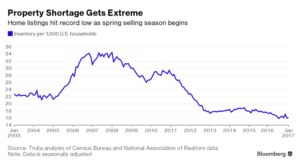 The winning bidder of a Grand Rapids, Michigan, house has been offered almost $20,000 to hand his purchase contract to another buyer. An agent in Nashville, Tennessee, got a property for his client by cold-calling local homeowners. Near Columbus, Ohio, it took a teacher five tries to secure a deal.
The winning bidder of a Grand Rapids, Michigan, house has been offered almost $20,000 to hand his purchase contract to another buyer. An agent in Nashville, Tennessee, got a property for his client by cold-calling local homeowners. Near Columbus, Ohio, it took a teacher five tries to secure a deal.
It’s the 2017 U.S. spring home-selling season, and listings are scarcer than they’ve ever been. Bidding wars common in perennially hot markets like the San Francisco Bay area, Denver and Boston are now also prevalent in the once slow-and-steady heartland, sending prices higher and sparking desperation among buyers across the country.
“Homebuyers are going to find this spring that, in a lot of markets, the inventory of homes priced and sized at price levels they were hoping for will be very limited,” said Thomas Lawler, a former Fannie Mae economist who’s now a housing consultant in Leesburg, Virginia. “Unlikely places are getting significantly tighter.”
Buyers are clamoring as an improved job market and growing confidence in the economy collide with rising mortgage rates — yet there’s little new inventory for them to purchase. Housing starts remain well below levels before the last recession, and builders have focused on higher-end properties out of reach for many people. Homeowners have become even more reluctant to sell because, after all, where are they going to move?
The three months through January had the fewest homes on the market on record, according to an analysis by Trulia. Prices jumped 6.9 percent in January from a year earlier, the biggest increase for any month since May 2014, data from CoreLogic Inc. show. And homes sold faster in the first two months of 2017 — spending an average 58 days on the market — than at the start of any year since at least 2010, according to brokerage Redfin.
Homes are moving fastest in Denver, Seattle and Oakland, California — areas where heated competition have become status quo in recent years because of soaring job growth, particularly in the technology industry. But fourth on Redfin’s list is Grand Rapids, Michigan’s second-largest city, in a reflection of strengthening employment across even the slower-growing center of the country. Buyers are also struggling in cities such as Boise, Idaho; Madison, Wisconsin; and Omaha, Nebraska.
Recent Comments